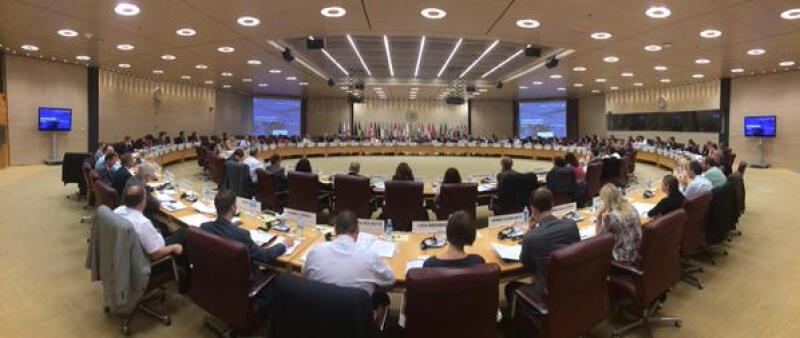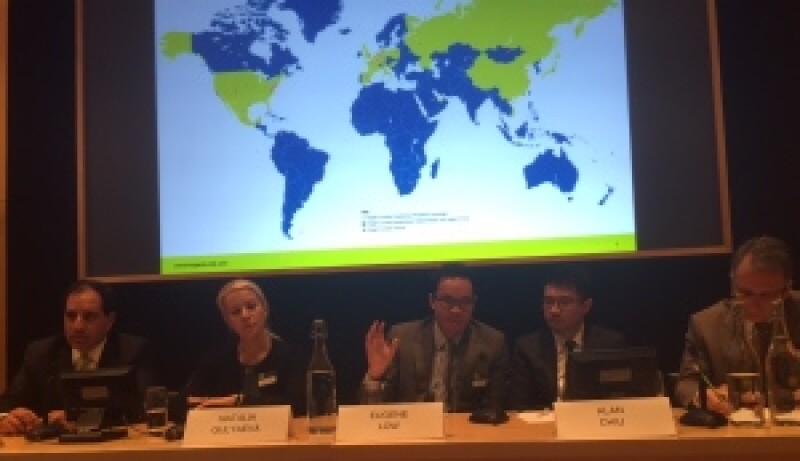
The ACG is marking (or in its words celebrating) World Anti-Counterfeiting Day with an enforcement-training event at Heathrow Airport, where new techniques will be showcased. Officers from the UK Border Force, HMRC, police and Trading Standards are participating. “This reflects the significance placed by enforcement authorities on training and ensuring officers are equipped with the necessary skills to combat this evermore-dangerous criminal activity,” says ACG’s press statement.
This is the 20th such training event to be held at the airport (right), which is one of the world’s busiest: it handled nearly 75 million passengers and 1.5 million metric tonnes of cargo last year.
Meanwhile, over in Alicante, OHIM (through the Observatory on Infringements of IP Rights), Europol and Eurojust are this week hosting an event (below left) on fighting counterfeit cosmetics, perfumes and luxury goods. The three-day meeting follows a recent report that these industries lose an estimated €5 billion each year to counterfeits.
One of the aims of the Alicante event is to “reinforce operational ties between enforcement authorities and businesses”. It has also led to the creation of a European IP Prosecutors Network, covering the EU member states, Norway and the USA.
Customs and private investigators

The importance of cooperation between public and private sectors was made clear at a breakfast seminar on IP in emerging markets, which I attended at the London office of Hogan Lovells this week. Lawyers from Mexico, Russia, Hong Kong and the UAE stressed the vital role that Customs officials and private investigators can play. But, as Peter Hansen of the firm’s Dubai office said, there is a fine line between cooperation and what he called “funny business”.
For example, making a test purchase of a small amount of counterfeit goods in a market should be above board, but placing a larger order with the seller could amount to entrapment, and even constitute aiding and abetting crime. Similarly, when working with public officials, most people would agree it is OK to provide free training and workshops, and short presentations about trade mark rights and wrongs. But is it also acceptable to offer samples or other gifts, and buy meals or drinks?
These questions are becoming more relevant as governments worldwide tighten up laws on bribery and corruption, and more countries sign up to the OECD Anti-Bribery Convention. In the UK, for example, the 2010 Bribery Act expands both the definition and geographical scope of bribery, as well as providing heavy penalties. Bribery of foreign public officials is a distinct crime under the Act.
Russell conjugation

Effective cooperation with enforcement authorities and constructive use of investigators are becoming more important in tackling counterfeits, especially as public resources are stretched and counterfeit trade spreads. But it’s also vital that all parties involved are clear about, and monitor, what is acceptable behaviour.
This is not always straightforward. Readers might be familiar with the so-called emotional conjugation, coined by the philosopher Bertrand Russell, which mimics an irregular verb. Examples include “I am firm; you are obstinate; he is a pig-headed fool” and (from the BBC TV comedy series Yes, Minister) “I have an independent mind; you are eccentric; he is round the twist”.
Well, what about this one? “I provided a service; you offered a gift; he paid a bribe.”
In recent years companies such as BAE, GSK and Goodyear have been targeted by bribery and corruption investigators, with some very expensive results. IP owners should avoid complacency and make doubly sure they’re not next in the firing line.









